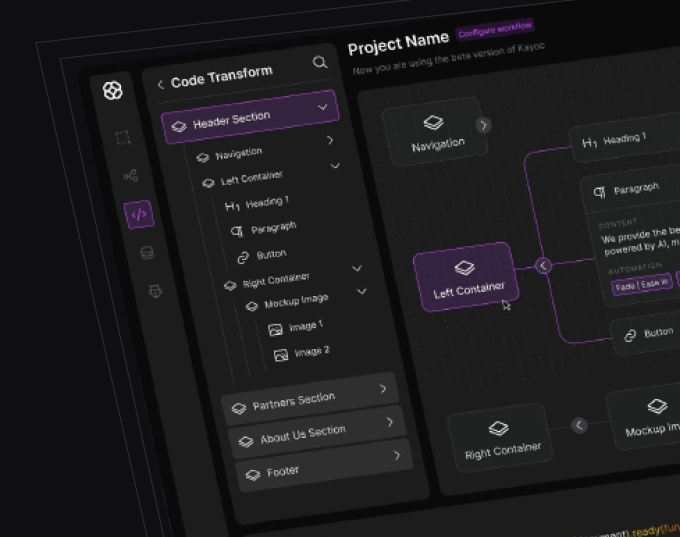DevOps Services
Innovative Services That Enables Faster & High Quality Deployments

Innovative Services That Enables Faster & High Quality Deployments
Heimler’s Journey From Blind Spots to Business Clarity – A3Logics Unleashes the Power of Live Intelligence
Discover More
Redefining the Future of Lending – Cred Fintech’s Monumental Transformation with A3Logics
Discover More
Revolutionizing Credit Risk – How A3Logics and Heimler Redefined Trust and Precision with Machine Learning
Discover More
Transforming Risk to Opportunity – A3Logics and Heimler Revolutionize Credit Risk Modelling
Discover More





















As a specialized DevOps company, A3Logics focuses on developing, integrating, testing, and deploying applications. We automate repetitive tasks, integrate tools and processes, and build a collaborative DevOps culture.

Elevate your DevOps journey with our thorough assessments. To tailor transformation strategies, we map out your DevOps maturity, tooling landscape, and workflow efficiency. Our process pinpoints your readiness for change, aligning with progressive DevOps adoption at a sustainable pace.
Elevate your DevOps journey with our thorough assessments. To tailor transformation strategies, we map out your DevOps maturity, tooling landscape, and workflow efficiency. Our process pinpoints your readiness for change, aligning with progressive DevOps adoption at a sustainable pace.
Opt for our fully managed DevOps services to streamline operations across development, integration, and deployment, reducing overhead and focusing on speed, quality, and reliability. We manage end-to-end processes, allowing you to concentrate on core business goals
Our DevOps consulting transcends basic assessments, providing robust, hands-on support to infuse DevOps practices into your ecosystem. From establishing pipelines to coaching teams, we ensure DevOps principles become ingrained, enhancing software delivery and cost efficiency.
Specializing in cloud-based DevOps, we configure essential cloud and on-premises resources to streamline your applications. Our approach incorporates VMs, storage, and databases, fostering a DevOps culture with tools designed for continuous integration and rapid deployment.
Configuration of VM, EC2: We provide pivotal infrastructure for DevOps workflows, specializing in configuring EC2 and other cloud services. Our approach optimizes cost and governance while ensuring your DevOps environment is robust and scalable.
Adopt our continuous release and deployment services for a seamless DevOps flow. We automate your processes to minimize errors and ensure consistent quality, securing rapid software release cycles with reliable automation and rollback strategies.
DevOps automation is the backbone of efficient workflows. We script and integrate tasks across the development lifecycle, reducing manual intervention and accelerating delivery. Our solutions focus on consistency and optimized governance.
Our around-the-clock support and continuous monitoring services provide proactive management and swift issue resolution, ensuring high application uptime and streamlined DevOps operations.
We help enterprises achieve digital transformation and deliver innovative products faster through DevOps services. Our process includes:
We evaluate clients’ existing environments & priorities to determine DevOps strategies & roadmaps tailored to their unique needs, while reducing costs and improving quality.
Experienced developers code and build robust software solutions using the latest technologies and frameworks like Containerization, microservices, cloud platforms and DevOps principles.
Automated builds integrate code from multiple branches or repositories into tested packages ready for deployment. Pipelines minimize integration complexity and accelerate the build-test-deploy cycle.
Automated testing and continuous integration ensure high quality through unit testing, integration testing, load testing, performance testing, security testing and monitoring.
Release management releases build frequently using feature flags and switch controls to control features in production environments. Canary releases, A/B testing, sandbox testing and rollback processes minimize risks.
Fast, reliable deployments move packages to development, testing and production environments. Automation simultaneously deploys code, configurations and infrastructure changes.
Infrastructure is provisioned and configured to run client applications using tools like configuration management, infrastructure as code, cloud platforms and security management systems.
Monitoring provides proactive insight into infrastructure, applications, alerts, incidents and metrics. Monitoring ensures reliability, security & regulatory compliance across environments.
A3Logics has a proven track record of delivering complex DevOps projects across industries. Our experience spans cloud migrations, containerized microservices, infrastructure modernization and global deployments. Our DevOps solutions leverage deep experience to navigate obstacles and implement DevOps successfully.
A3Logics teams include highly skilled DevOps engineers, developers, testers, architects and consultants with certifications in cutting-edge DevOps, software engineering and IT practices. Our DevOps consulting services offer clients cutting-edge skills and continuous learning.
A3Logics integrates the strongest security DevOps solutions and practices into all aspects of DevOps, including identity and access management, threat modeling, penetration testing, cryptographic encryption and more. We implement defence-in-depth and least-privilege approaches for hardened security.
Unlike general DevOps solutions providers, A3Logics focuses exclusively on DevOps. Our experts are explicitly dedicated to helping clients adopt DevOps methodologies and technologies. The A3Logics team comprises certified DevOps professionals passionate about optimizing software delivery.
A3Logics implements strict data security through encryption, key management, tokens, access control, and monitoring across infrastructure, repositories, databases, networks and end-user devices. Our DevOps consulting services prevent data breaches, leaks, corruption and compromise while ensuring regulatory compliance.
A3Logics redesigned the logistics software of a mobile app solutions company’s end customer. The project included creating a comprehensive solution with reporting features, order tracking, and system updating.

“Their distinct flexibility and their strong communication were the project’s main assets.”


A construction technology company hired A3Logics for custom software development. They created a construction digital platform that allows users to see project areas, distribute resources, and share data.
“Their software has proven essential in the construction sector.”

A3Logics created and implemented a custom logistics software solution for a wealth management platform. This included developing features and integrating real-time tracking and data analytics functionalities.

“They ensured our collaboration went well by providing timely items and responding quickly to our requests.”


A3Logics created and executed a personalized Generative AI system that featured chatbots for customer service, prediction algorithms, and AI-powered data analysis tools.

“Their technical expertise and reactivity were excellent.”


A3Logics has developed an administrative management system for a health testing company. The product is designed to handle operations such as consultant matching, time reporting, and compensation management.

“The collaborative team we’ve worked with has shown great flexibility and excellent project integration.”


A transportation company hired A3Logics to create a custom software program for freight activity tracking. The team also created invoicing tools and a driver-tracking system connected to a dispatch system.

“Their thorough inquiry and engagement with our team reflect their commitment to understanding our requirements.”


● Evaluating clients’ environments and requirements to determine DevOps roadmaps.
● Providing strategic guidance on implementing DevOps frameworks, metrics, tools and workflows.
● Coaching development, integration and operations teams on DevOps methodologies.
● Advising on DevOps tools, processes and culture changes to improve software delivery speed, quality and reliability at a lower cost.
● Offering managed or support services for DevOps initiatives, including governance, automation and optimization.
Key DevOps services include:
● Consulting: Advisory and guidance on DevOps strategy, frameworks and transformation.
●Assessment: Evaluating DevOps maturity, metrics, tools, processes and impediments.
●Managed Services: Full lifecycle management of DevOps initiatives, including planning, implementation, governance and support.
●Integration: Integrating development and operations tools/infrastructure, workflows and culture.
● Automation: Automating software build, test, deploy, release, monitoring and management functions.
● Continuous Monitoring: 24/7 visibility and alerting on infrastructure, applications, services, metrics and incidents.
●Security: Integrating tools and best practices for identity, access management, threat detection, encryption, compliance and risk mitigation.
Amazon Web Services (AWS) is not inherently part of DevOps services. However, AWS and other cloud platforms are often used to implement DevOps principles. Some common ways DevOps and AWS integrate include:
● Infrastructure as Code: Writing AWS infrastructure using code for provisioning, testing infrastructure changes in a sandbox and deploying resources.
●Continuous Integration/Continuous Deployment: Setting up automated build-test-deploy cycles for deploying changes to AWS cloud resources and EC2 instances.
● Microservices Architecture: Using AWS to run containerized microservices that can be developed, tested and deployed independently.
The 7 Cs of DevOps represent core DevOps services principles and practices:
● Culture: Building a culture of collaboration, integration, automation and continuous delivery across development and operations.
● Communication: Improving communication between stakeholders, development, integration, testing and operations teams.
● Code:Automating the building, testing, deploying and promoting of code for rapid release.
●Collaborate:Facilitating collaboration through improved integration, workflows, tooling and metrics.
● Commitment: Driving commitment to DevOps priorities from leadership and key stakeholders.
● Community:Encouraging involvement from the broader technology and business community.
● Continues Development: Continuous development means frequent integration, testing and deploying of new features and enhancements. It enables quick adaptability to changes and a faster feedback cycle.


Marketing Head & Engagement Manager